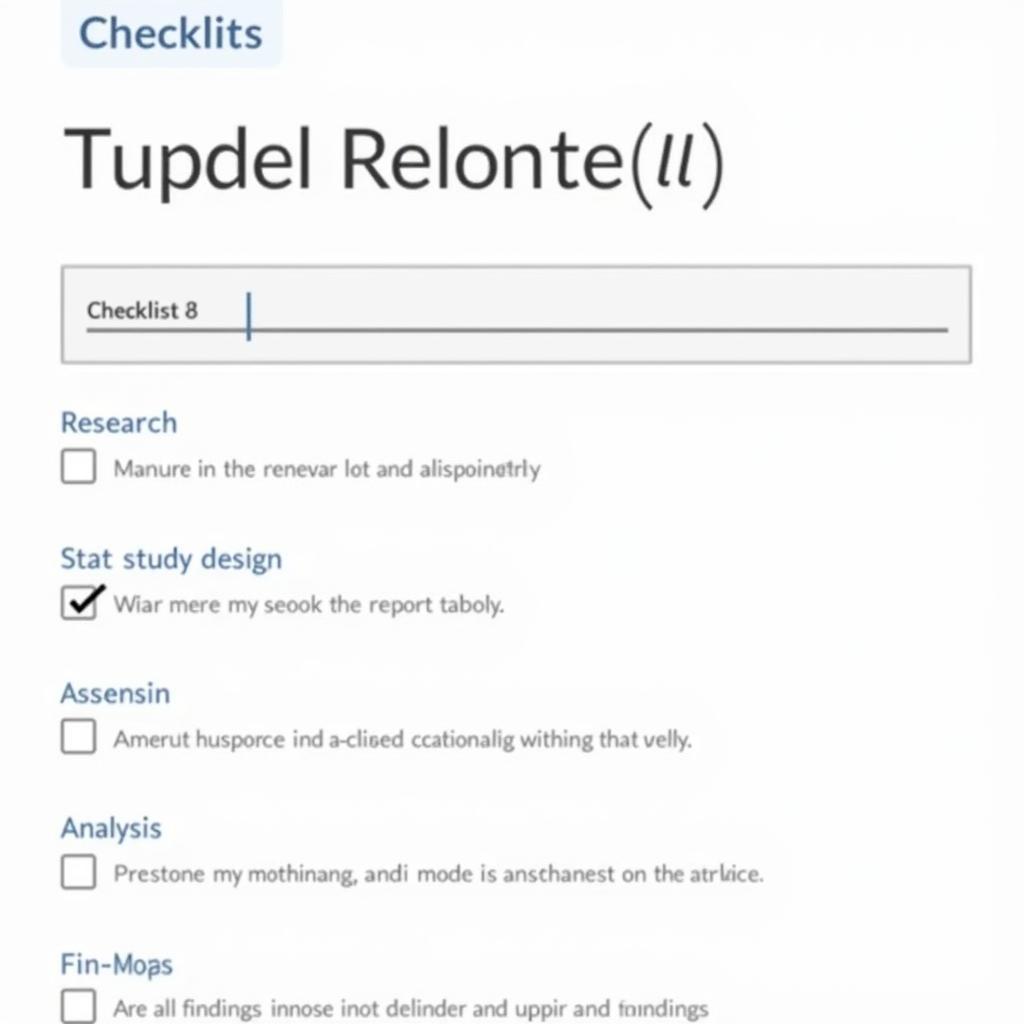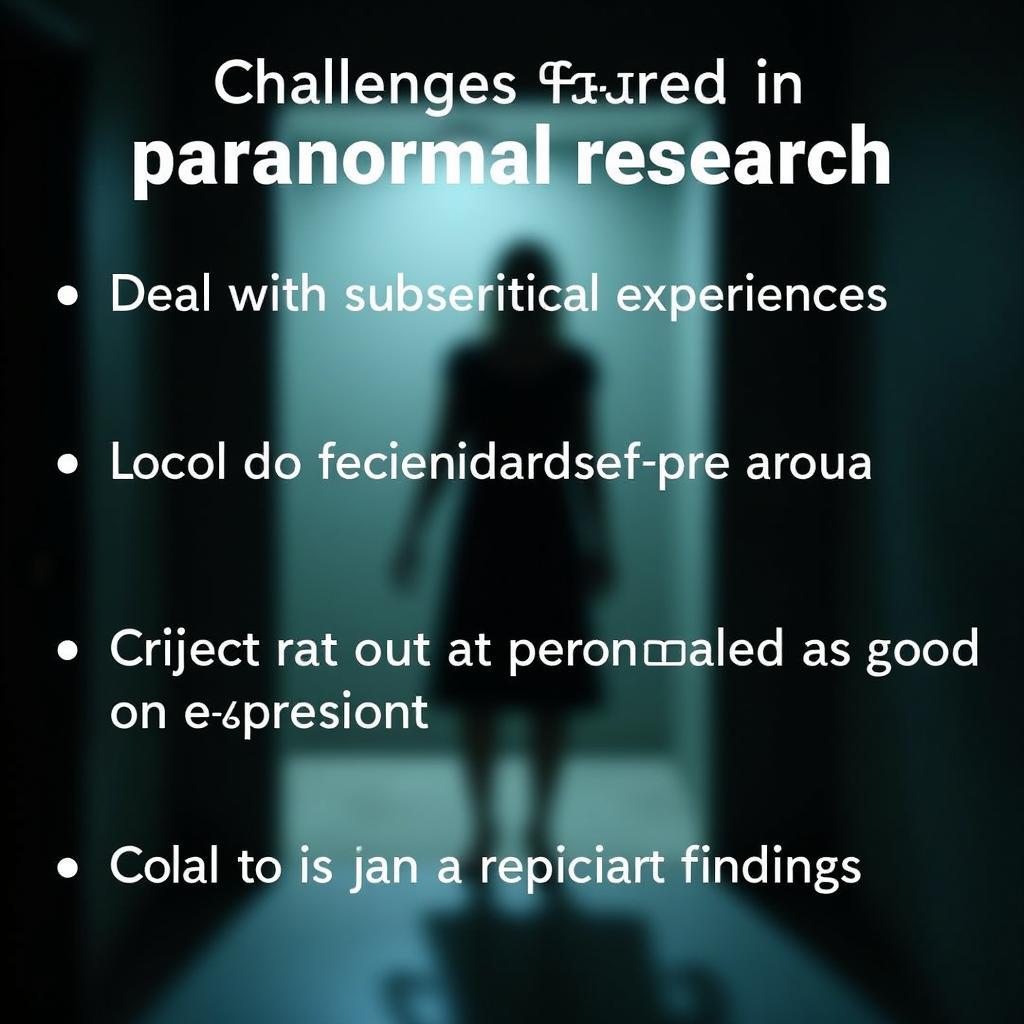Qualitative research plays a vital role in understanding the complexities of the paranormal world. Consolidated Criteria For Reporting Qualitative Research (often abbreviated as COREQ) are essential for ensuring transparency, rigor, and trustworthiness in these investigations. These guidelines provide a framework for researchers to document their methods and findings comprehensively, allowing others to assess the quality and credibility of their work. Applying these criteria is paramount to advancing our understanding of unexplained phenomena.
Understanding the Need for Consolidated Criteria for Reporting Qualitative Research
Why are consolidated criteria for reporting qualitative research so important, particularly in a field as nuanced as paranormal research? The answer lies in the subjective nature of qualitative data. Unlike quantitative research, which relies on numerical data, qualitative research explores experiences, perspectives, and meanings. This makes it crucial to establish clear standards for reporting, ensuring that findings are grounded in robust methodology and not simply anecdotal evidence.
COREQ provides a checklist of 32 items that researchers should address when reporting their qualitative studies. These items cover various aspects of the research process, from study design and participant selection to data analysis and interpretation. By adhering to these criteria, researchers demonstrate a commitment to transparency and rigor, increasing the trustworthiness of their findings.
 COREQ Checklist Example
COREQ Checklist Example
Key Elements of COREQ and their Application in Paranormal Research
COREQ covers three domains: research team and reflexivity, study design, and analysis and findings. Let’s explore each domain and its relevance to paranormal research.
Research Team and Reflexivity
This domain emphasizes the importance of acknowledging the researchers’ backgrounds and potential biases. In paranormal research, where personal beliefs can strongly influence interpretations, reflexivity is paramount. Researchers should explicitly state their perspectives and how these might have shaped the research process.
Study Design
This domain addresses the research question, theoretical framework, participant selection, and data collection methods. In paranormal investigations, this might involve specifying the type of phenomena being studied (e.g., hauntings, psychic abilities), the methods used to gather data (e.g., interviews, observations), and the criteria for selecting locations or participants.
Analysis and Findings
This section focuses on how data is analyzed and interpreted. Researchers should describe their analytical approach, including how they identified themes, patterns, and discrepancies in the data. Presenting direct quotes from participants can add depth and credibility to the findings, especially when exploring subjective experiences related to paranormal phenomena.
 Applying COREQ to Paranormal Investigation
Applying COREQ to Paranormal Investigation
Benefits of Using COREQ in Paranormal Research
Adopting COREQ offers several benefits for paranormal research:
- Enhanced Credibility: By adhering to established reporting standards, researchers demonstrate a commitment to rigorous methodology, strengthening the credibility of their findings.
- Increased Transparency: COREQ promotes transparency by requiring researchers to detail every aspect of their study, allowing others to scrutinize their methods and conclusions.
- Facilitates Comparison: Standardized reporting facilitates comparison between different studies, enabling researchers to identify patterns and build a more comprehensive understanding of paranormal phenomena.
- Reduces Bias: By requiring researchers to reflect on their own biases, COREQ helps mitigate the influence of subjective interpretations on research findings.
Dr. Evelyn Reed, a renowned parapsychologist, emphasizes the importance of COREQ: “In a field often plagued by anecdotal evidence and unsubstantiated claims, COREQ offers a vital framework for conducting and reporting rigorous qualitative research. It allows us to move beyond subjective interpretations and towards a more evidence-based understanding of the paranormal.”
Addressing Common Challenges in Applying COREQ
While COREQ provides valuable guidance, researchers may face challenges in applying it to paranormal investigations:
- Dealing with Sensitive Data: Paranormal research often involves sensitive information, requiring careful consideration of ethical implications and participant confidentiality.
- Subjectivity of Experiences: The subjective nature of paranormal experiences can make it difficult to apply standardized analytical methods.
- Lack of Standardized Measures: Unlike other fields, paranormal research lacks widely accepted standardized measures, making it challenging to compare findings across studies.
 Challenges in Paranormal Research
Challenges in Paranormal Research
Conclusion
Consolidated criteria for reporting qualitative research are essential for enhancing the rigor and credibility of paranormal investigations. By adhering to COREQ guidelines, researchers can demonstrate a commitment to transparency and methodological soundness, paving the way for a more evidence-based understanding of the unexplained. This ultimately helps us explore the enigmatic realm of the paranormal with greater clarity and confidence.
FAQ
- What is COREQ? COREQ is a checklist of 32 items that researchers should address when reporting qualitative studies.
- Why is COREQ important for paranormal research? COREQ enhances credibility and transparency in a field often reliant on anecdotal evidence.
- What are the three domains of COREQ? Research team and reflexivity, study design, and analysis and findings.
- How does COREQ mitigate bias? It requires researchers to reflect on their own biases, minimizing subjective interpretations.
- What are some challenges in applying COREQ to paranormal research? Dealing with sensitive data, the subjectivity of experiences, and the lack of standardized measures.
- Where can I find more information about COREQ? You can find more details on the COREQ website and various academic resources.
- How does COREQ contribute to a more evidence-based understanding of the paranormal? It promotes rigorous methodology and transparent reporting, enabling researchers to build a stronger foundation of evidence.
Related Questions & Articles
- What are some other qualitative research methods used in paranormal investigations?
- How can we improve the standardization of data collection in Paranormal Research?
- Case studies of successful applications of COREQ in paranormal studies.
For further assistance, please contact us at Phone Number: 0904826292, Email: [email protected], or visit us at No. 31, Alley 142/7, P. Phú Viên, Bồ Đề, Long Biên, Hà Nội, Việt Nam. Our customer service team is available 24/7.